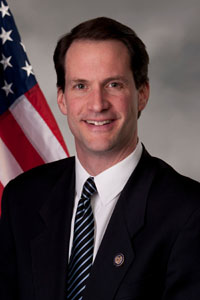
A quartet of congressmen, including U.S. Rep. Jim Himes of Greenwich, have introduced a bill to modify a portion of Dodd-Frank that observers say makes it more costly for businesses like farmers and manufacturers to hedge against price fluctuations.
The Swaps Regulatory Improvement Act proposes to allow federally insured financial institutions to conduct trading in certain types of swaps, such as commodity and equity derivatives, that can be used by companies as risk-mitigation tools.
It would modify Section 716 of the Dodd-Frank Wall Street Reform and Consumer Protection Act, which prohibits federally insured banks from conducting certain swaps trading and forces banks to “push out” those activities into over-the-counter exchanges ”” an activity Himes says compromises regulatory oversight and raises the cost of hedging for companies.
“Everybody out there hedges ”” Coca-Cola, Walmart, CL&P (Connecticut Light & Power),” Himes said. “I don”™t want to overstate the case, but on the margins, people need to hedge risk and this ”” Section 716 ”” would have raised the cost of hedging for everybody without any tangible benefit to the country.”
Himes said the bill would only impact a small section of the derivatives regulations contained in Dodd-Frank, most of which he said accomplish “some very good things,” such as to mandate that swaps are traded on open exchanges after passing through clearing houses, and that they are subject to federal oversight.
“None of that changes,” Himes said, noting that banks would continue to be required to “push out the dangerous stuff” to over-the-counter exchanges to limit the risk of swaps trading to consumers.
Analysts say the bill, which has garnered broad bipartisan support and the backing of Federal Reserve Board Chairman Ben Bernanke, represents one of the first earnest attempts to amend the complex financial regulatory bill framed by former Sen. Christopher Dodd and former Rep. Barney Frank.
Marci Rossell, senior economic advisor for Delphin Investments L.L.C., a Stamford investment firm, said Section 716 goes against the overall goal of Dodd-Frank, which was to reduce risks posed by the financial system to consumers.
“The point of Dodd-Frank was to reduce risk in the system,” Rossell said. “With swaps used the way they”™re talking about ”¦ this is a way to allow businesses to reduce risk. And that”™s the whole point of the regulation in the first place.”
She said that in the process of creating Dodd-Frank, there were likely unintended consequences that have yet to be sorted out.
“What struck me as interesting is this seems to be the first Dodd-Frank workaround ”“ at least the first big Dodd-Frank workaround,” Rossell said. “There”™s recognition that it was a hastily passed, difficult, large and unwieldy bill with tons of unintended consequences built into it.”
Himes co-sponsored the bill, which mirrors a version that was proposed but never voted on during the previous legislative session, along with Reps. Randy Hultgren, an Illinois Republican, Richard Hudson, a North Carolina Republican, and Sean Patrick Mahoney, a New York Democrat.

















